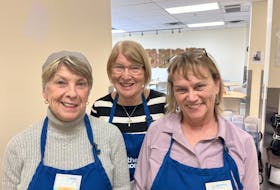TRINITY, N.L. — First in a series
Marieka Gow wears a mask as she serves a cup of coffee and a little white jug of milk on a tray. She moves her chair slightly away from the small table as she sits down to chat.
Eventually, sitting on opposite corners of a larger table proves a more practical way to physically distance.
When restaurants were allowed to open again in early summer, Gow made sure staff at the Twine Loft in Trinity were comfortable in doing so.
“Our mentality was, we should operate as if we were in the height of the pandemic — I mean, in a sense we were,” she says during a mid-August interview on the upper floor of the two-storey dining space.

“My big fear was, OK, if suddenly some cases start arising, then staff would be like, ‘Oh, we’re not working’ in two or three weeks from now, and then you have to cancel the reservations you’ve already made.”
The restaurant only opened to customers Aug. 15. That was after employees realized an unplanned elopement party they hosted proved a safe dining experience was possible.
“You can’t really judge anyone if they want to put their own health first,” she says.
Gow is part-owner of the Artisan Inn and Twine Loft with her mother, Tineke. The family also owns seven rental properties, as well as Campbell House, a two-bedroom bed and breakfast that kicked off a 30-year legacy of investment in the community.
Tineke was an immunologist from Holland who arrived in Canada in 1967 and later moved to this province with her husband to work at Memorial University.
“Bringing people here, it keeps the town alive, it keeps employment here.” — Sharon Vokey
Marieke decided to become a full-time resident of Trinity after the global economic meltdown of 2008. She was living in Ontario at the time, and agreed to come home and help her parents out with the business.
She hasn’t looked back.
Last year, Tineke and Marieke were awarded Newfoundland and Labrador’s Tourism Achievement Award at the annual Hospitality Newfoundland Labrador convention. The award recognizes an outstanding group or individual’s long-time achievement and dedication to the tourism industry.
Long legacy
No Newfoundland town comes close to the success of Trinity — perched on a jut of land along the east coast of the Bonavista Peninsula — in reinventing itself as a living museum.
The resurrection of this small shipbuilding centre as a magnet for tourists from home and abroad is remarkable, especially after the cod moratorium of 1992.
“Until the moratorium, they caught fish. Now they catch tourists,” says Mark Critch, the nationally known comedian and actor who fell in love with the town in the 1990s.
He eventually purchased a house there, something numerous “townies” — people from the capital of St. John’s — have been doing since the village started gaining a reputation as a mecca for arts and culture in the 1970s.
Trinity’s history as a community extends to the earliest days of North American settlement.
The most lasting legacy can be found in the restored Lester Garland premises, which date back to the 17th century.
“Lester-Garland House provides a visible means of interpreting the historic links between Poole (England) and Trinity, and the role of Trinity as a centre of trade and commerce in the 17th, 18th and 19th centuries,” the Trinity Historical Society states on its website.

Even that only scratches the surface.
Retired Memorial University professor Hans J. Rollmann explains how, around 1800, Rev. John Clinch of Trinity’s St. Paul’s Anglican Church became the first person in North America to inoculate hundreds of parishioners against the smallpox virus using a cowpox formula developed in England.
“This first inoculation in Newfoundland is said to have preceded introduction of the vaccine in the United States by three years,” Rollmann writes on his Facebook page.
Clinch, who first inoculated his own children to convince skeptics, is buried in the church graveyard.
Bought in
Sharon Vokey, who’s lived in Trinity since her parents dragged their children back to their hometown in 1979, says she loves the fact the town has survived as a draw for tourism.
“I think, for the most part, we’ve all bought in,” she said, sitting on the town’s marina on a Sunday morning. The Dock Marina restaurant next door had to remove tables to meet half-capacity rules, but was still buzzing with customers.
“We love it,” Vokey said. “Bringing people here, it keeps the town alive, it keeps employment here.”
Vokey was a senior executive with the province’s Progressive Conservative Party for many years, and former candidate last year. She’s also a business manager.
The renaissance for Trinity started at least a half-century ago, she says.
“There was a big project in the late 1970s and mid-1980s when the town really focused on keeping the town looking historic, and there was a lot of government money pumped in here at the time.”
That momentum has rarely lost steam.
Says Critch: “It’s always surprised me how it kind of keeps growing. You’d expect it to be far more fleeting than it is, but it’s become a kind of industry. It’s great to see.”
Tuesday: The Trinity magic spreads









